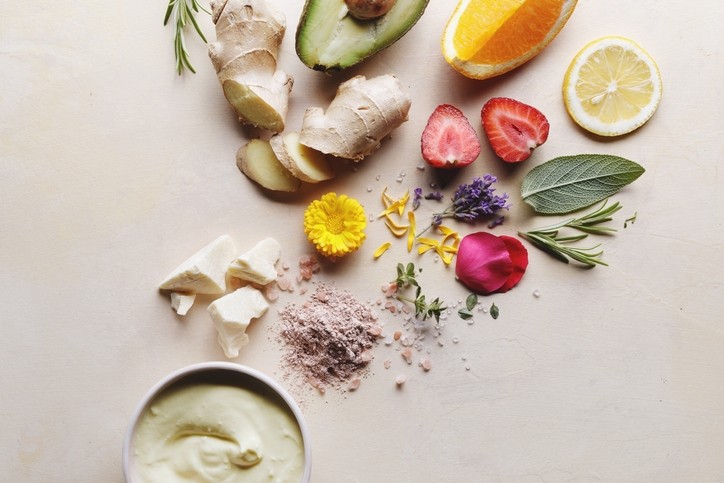6 new plant-based cosmetic ingredient innovations

Plant-based emollient
Sonneborn LLC has launched SonneNatural™ NXG, a new plant-based emollient that enhances lip balm, lipstick, body lotion and facial scrub formulations.
The ingredient has firmness and sensory properties and reduces the amount of thickener or wax needed in the end formulation for anhydrous formulas.
It’s been specially developed with an occlusive agent to help stabilise cosmetic formulas, making it a perfect plant-based alternative to lanolin or other animal-based emollients.
Upcycled skin care active
Expanscience has transformed one of its flagship active ingredients to improve skin elasticity and reshape facial contours into an organic version, CO2LLAGENEER® Bio.
The active ingredient is obtained by a supercritical CO2 extraction process. It’s an upcycled by-product of the agri-food industry and organic-certified at 95.4% by Ecocert Greenlife, according to the COSMOS standard.
The ingredient is based on a concentration of lupéol, extracted from the seeds of French sweet white lupine, from the West of France. This is then combined with organic oleic sunflower oil.
In-vitro tests demonstrates that the active ingredient stimulates collagen synthesis to improve skin elasticity, and reshapes and firms areas prone to sagging. It also stimulates the production of quality collagen by activating the chaperone protein HSP47 (Heat Shock Protein), contributing to its optimal organisation and structure.
Circular ingredient with malodour counteracting effects
The ‘circular chemistry’ ingredient holds promising malodour counteracting properties, according to Barcelona-based Eurofragance.
The new ingredient is based upon a previous launch L’Âme du Bois – a proprietary upcycled ingredient made from discarded sawdust of western red cedarwood. It’s created from the natural crystallisation process to precipitate and extract methyl thujate present in the wood’s essential oil as crystals.
Verdenix™ was then obtained by similarly treating the residues from producing the first ingredient.
Eurofragance’s R&D team worked with perfumers to incorporate it into existing or new fragrance compositions and it gives the typical olfactive notes of cedarwood, which makes it relatively easy to integrate into perfume formulas as a bottom note.
The ingredient also works to eliminate and harmonise malodours. It was tested on a variety of smells, such as tobacco, and it reduced malodour perception up to 80%, which is equivalent or even above other similar chemicals, such as citral or ethylene brassylate.
Multi-purpose active based on alfalfa
The multifunctional natural active is enriched in alfalfa galactomannans, which enhances the beauty of all skin types, and its efficacy has been demonstrated on various panels.
To develop the active ingredient enriched in galactomannans, SILAB used the seeds of the alfalfa plant from certified organic farms selected in France with a secure, traceable supply.
It then combined its expertise in tissue engineering and transcriptomics to explore the transversal activity spectrum of the ingredient on the biological pathways essential for epidermal and dermal functions.
A large-scale exploratory study has been established that the ingredient stimulates epidermal functionalities by modulating the biological pathways related to the physical and water barrier, the immune barrier, and the anchoring of the epidermis to the dermis; and reinforces the dermal matrix quality by boosting the synthesis of collagen I and reducing the synthesis of MMP-1.
Upcycled citrus byproduct
CP Kelco’s KELCOSENSTM Citrus Fiber has been certified as an upcycled ingredient by the Upcycled Food Association.
The ingredient is upcycled from spent citrus peels, a byproduct of the juice industry near the company’s manufacturing facility in Brazil.
With a circular approach, leftover materials from the citrus fibre production process are repurposed and nutrients in the process water are used to fertilise local crops, such as sugar cane.
The personal care ingredient can be used in a range of products, from silky serums to luxe creams, to help formulators stabilise emulsifier-free formulations and deliver different textures.
Cold-pressed black seed oil
B’utyQuin™ TriNutra’s cold-pressed black seed oil (BSO) standardised to 3% thymoquinone, the key phytonutrient, with low free fatty acids (<2%) to maintain its purity, quality, stability and bioavailability. It has been shown in vitro and clinically to possess antimicrobial, antioxidant, anti-inflammatory and mitochondrial functionality improvement properties to improve and protect skin and scalp health.
One published in-vitro study demonstrated B’utyQuin’s ability to both support the maintenance of a healthy skin and gut microbiome via anti-bacterial and antifungal activity against pathogens. The study investigated four black seed oil products from different origins with varying levels of thymoquinone and free fatty acid content. Of the four products, B’utyQuin was superior in its ability to inhibit the overgrowth of Malassezia furfur, Candida albicans and Staphylococcus aureus.











![Chinese study highlights mental health challenges in atopic dermatitis, emphasising holistic patient care. [Getty Images]](jpg/chinese-research-linking-atopic-dermatitis-to-mental-health-underscores-need-for-holistic-care-2.jpg)








